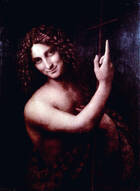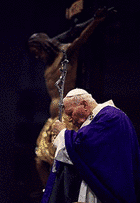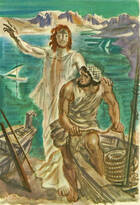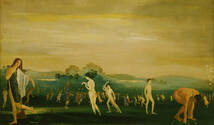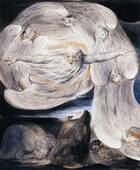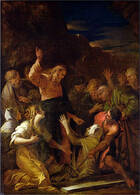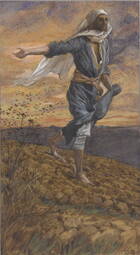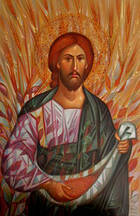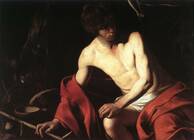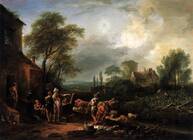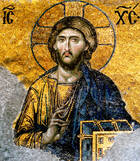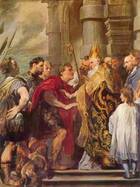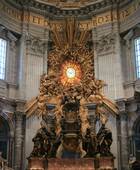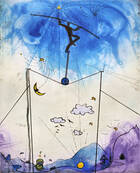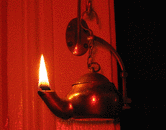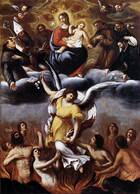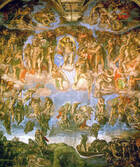Sunday Evangelium in Ordinary Time
Here are homilies given by Father Andrew Pinsent & Father Marcus Holden during 'ordinary time' eg when we're not preparing for / celebrating Christmas or Easter. Liturgical 'Year A' began on the 1st Sunday of Advent, 1 December 2013.
You can subscribe to this Totus2us podcast here on the RSS web feed or here on itunes. Plus you can download the free mp3 audio recordings individually by right / double clicking on the blue play buttons.
2nd Sunday of the Year
by Father Andrew Pinsent, in Year A ![]()
Conversion and the call to holiness
"Just as Jesus' own life was hidden for so many years, the real battle for holiness is largely conducted in the human heart and in secrecy. Blessed John Henry Newman refers to 'secret prayers, secret deeds, secret self-denials, secret struggles and secret victories.' As we begin this new year I would like to suggest we renew our commitment to at least the following 3 actions of the life of genuine holiness, actions that are invisible to others but visible to God. 1st, the practice of confession, by which God heals our hearts from sin. 2nd, the practice of secret, personal daily prayer, by which we come to know and love God intimately. 3rd, the practice of at least a little secret self-denial, by which the root of selfish love is gradually killed within us. May God grant we make use of the extraordinary opportunities for genuine holiness that He has given us, that we come to know and love Him more deeply, and be ready one day to enter His heavenly kingdom."
Readings: Gospel - John 1: 29-34 - “John the Baptist saw Jesus coming toward him and said, “Behold, the Lamb of God, who takes away the sin of the world. He is the one of whom I said, ‘A man is coming after me who ranks ahead of me because he existed before me.’”"
3rd Sunday of the Year
by Father Andrew Pinsent, in Year A ![]()
John Paul II, suffering & the power of the Cross
"This warning not to empty the power of the Cross was the title of the 3rd and final part of the most important document Pope John Paul II ever wrote on the moral life. That document was called 'Veritatis Splendor' (The Splendour of Truth) and Pope John Paul II witnessed to that truth by becoming a kind of icon of the Cross in the last days of his life. His body was crucified by suffering and disability, the lingering effects of an assassination attempt and Parkinson's disease. In the words of that chilling phrase, heard ever more frequently in today's society, the last days of the earthly life of the Holy Father might have been considered a 'life not worth living'. Yet the evidence for the supernatural power of his last days were shown especially in the signs that followed his death. In a great outpouring of grief over 5 million people came to Rome to pay their last respects in person, and his funeral was watched on television by over 2 billion people. Rather than being a life that was 'not worth living' the last days of Pope John Paul II were marked by miraculous and very visible fruits in this world. Yet Pope John Paul II was clearly suffering intensely during his last years and this fact draws attention to a long-standing problem. This problem often takes the form of a popular question: "Why do bad things happen to good people if there is a good God?""
Readings: 2nd Reading - 1 Cor 1: 10-13, 17 - “For Christ did not send me to baptize but to preach the gospel, and not with the wisdom of human eloquence, so that the cross of Christ might not be emptied of its power."
by Father Andrew Pinsent, in Year B ![]()
"Many Christians however still live with divided hearts, adding some practices of the City of God to lives that are still shaped to some degree by the City of Man. As a result many Christians are less effective and fruitful in this world than they should be. The step which most Christians find difficult is to surrender all things to God as revealed in His Son Jesus Christ, and to surrender things to the guidance of the Holy Spirit. This surrender may or may not involve a physical abandonment of our possessions, as the Apostles did in today's Gospel, by abandoning their fishing nets and following Christ. But this surrender does involve putting God first, whatever our walk in life, to devoting significant time to daily prayer and the Sacraments, to following our God-given vocation and seeing the passing things of this world from the perspective of our true home which is in heaven."
Readings: Gospel: Mark 1:14-20: After John had been arrested, Jesus came to Galilee proclaiming the Gospel of God: This is the time of fulfillment. The kingdom of God is at hand. Repent, and believe in the gospel. As he passed by the Sea of Galilee, he saw Simon and his brother Andrew casting their nets into the sea; they were fishermen. Jesus said to them, "Come after me, and I will make you fishers of men." Then they abandoned their nets and followed him."
4th Sunday of the Year
by Father Andrew Pinsent, in Year A ![]()
"Jesus does not simply promise this thief paradise, a paradise which could be the Elysian Fields, but he says, “This very day you will be with me in paradise.” That clause, ‘with me’ marks the difference between the pagan and the Christian ideals of eternal life. The Elysian Fields, for all their beauty, have an emptiness that ultimately fails to satisfy. By contrast, the kingdom of heaven is not just paradise, but the place where God is, as described by the words of the Lords Prayer, “Our Father, who art in heaven.” It is friendship with God and the sight of God that satisfies the human soul forever. May God help us to avoid being seduced into pursuing false or incomplete notions of happiness, to follow him along the way of the Beatitudes, and come one day safely to the true kingdom of heaven."
Readings: Gospel - Matthew 5: 1-12 (The Beatitudes) - Jesus began to teach them, saying: “Blessed are the poor in spirit, for theirs is the kingdom of heaven. Blessed are they who mourn, for they will be comforted. Blessed are the meek, for they will inherit the land. Blessed are they who hunger and thirst for righteousness, for they will be satisfied. Blessed are the merciful, for they will be shown mercy. Blessed are the clean of heart, for they will see God. Blessed are the peacemakers, for they will be called children of God. Blessed are they who are persecuted for the sake of righteousness, for theirs is the kingdom of heaven. Blessed are you when they insult you and persecute you and utter every kind of evil against you falsely because of me. Rejoice and be glad, for your reward will be great in heaven.”
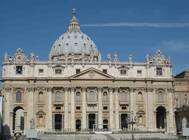
5th Sunday of the Year
by Father Marcus Holden, in Year A ![]()
"Our Lord says today in the Gospel 'Let your light shine before men, so that seeing your good works they may give praise to your Father in heaven.' Are we letting the light shine that has come from the Catholic faith? A very important vehicle for evangelization is the presenting of the fruits of the faith; to show even from a non-faith perspective that the Church has been the soul of the world; that when you take her contribution to civilzation away there's not much left; and without her, without her influence, there's a danger of descending to a new kind of dark age."
Readings: Gospel - Matthew 5: 1-12 - Jesus said to his disciples: "You are the light of the world. A city set on a mountain cannot be hidden. Nor do they light a lamp and then put it under a bushel basket; it is set on a lampstand, where it gives light to all in the house. Just so, you light must shine before others, that they may see your good deeds and glorify your heavenly Father.”
by Father Marcus Holden, in Year B ![]()
"Our task therefore is to awaken our age out of its apathy and indifference to consider that life may be worth living, that there may be some meaning to our being born into this colourful world, that there might be something a little more profound about those whom we love than a random mutation of chemicals, that death may be questioned and need not be seen as the end. This is the way of Job. There is perhaps more to people than the next pleasure, the next honour, the next victory. Our job is to convince people to see further, to question more, to offer the goodness that St Paul speaks of. ... I invite you, finally, to listen to the words of Pope Benedict: 'Only where God is seen, does life truly begin. Only when we meet the living God in Christ do we begin to know what life is. We are not some casual and meaningless product of evolution. Each of us is the result of a thought of God: each of us is willed, each of us is loved, each of us is necessary. There is nothing more beautiful than to be surprised by the Gospel, by the encounter with Christ; there is nothing more beautiful than to know Him and to speak to others of our friendship with Him."
Readings: 1st Reading: Job 7:1-4, 6-7: My days are swifter than a weaver's shuttle; they come to an end without hope. Remember that my life is like the wind; I shall not see happiness again. "

6th Sunday of the Year
by Father Marcus Holden, in Year A ![]()
"In his marvellous fictional book, The Screwtape Letters, C.S. Lewis shows how a demon called Wormwood ingeniously seeks to destroy a particular soul. Although a humourous work, this story gives us great truths. The man, wittily called the client, sins and then repents, but keeps returning to the same sin, as if in a perpetual cycle. This is because he never thinks to address the reasons and causes for his falling into that sin. How many of us have found ourselves confessing the same sins over and over again. One of the reasons for our lack of progress is quite simply because we fail to tackle the real occasions for sin. To be tough on sin as Our Lord would have, we have to be tough on the causes of sin, and the occasions that bring about sin almost like clockwork are the first things we must address. Let's face it, and it's hard for our pride to do so, we're not as strong as we think we are; we're not as strong as we think to resist all sins in all situations. The occasions matter and it is to these that we must turn."
Readings: Gospel - Matthew 5: 17-37 - Jesus said to his disciples: "Do not think that I have come to abolish the law or the prophets. I have come not to abolish but to fulfill.”
by Father Andrew Pinsent, in Year B ![]()
"An extreme version of this fear of illness and suffering seems to be much of the inspiration for the increase in suicides today and the drive to promote the practice of euthanasia, the killing of those deemed unfit to live. Many saints, by contrast, have made a special point of overcoming their natural repulsion or fear for some of the worst diseases, especially leprosy. They've looked beyond the disease to see the person suffering as a beloved child of God. For St Francis of Assisi, a major turning point in his path to extreme holiness was when he embraced a leper. St Damien, who died in 1889 after caring for lepers for many years, is the first officially recognised saint of Hawaii. What then inspires people like St Francis, St Damien and many others, who are largely unknown, to care for the sick and outcast in this way? The most straightforward answer is that, by surrendering to the love of God, they were given the gifts that they needed to accomplish great deeds. Their lives show the fruit of the Holy Spirit called benignity, which is like a holy fire by which a person melts to relieve the needs of others. They also had a special form of courage. The source and keystone of this courage was not a confidence in their own physical survival, indeed St Damien himself died of leprosy, this courage is a gift of the Holy Spirit, a confidence in attaining heaven, the only goal that really matters, so long as one remains in personal union with God. "
Readings: Gospel: Mark: 1, 40-45: A leper came to him and kneeling down begged him and said, "If you wish, you can make me clean." Moved with pity, he stretched out his hand, touched him, and said to him, "I do will it. Be made clean." The leprosy left him immediately, and he was made clean.

7th Sunday of the Year
by Father Andrew Pinsent, in Year A ![]()
"Giving thanks recognises gift, and gift breaks down the logic of entitlement that demands hatred be returned for hatred. May God help us to see the struggle against evil from the perspective of divine wisdom, so that we love our enemies, pray earnestly for those who persecute us, and come safely with them one day to the kingdom of heaven."
Readings: Gospel - Matthew 5: 38-48 - Jesus said to his disciples: ".. You have heard that it was said, You shall love your neighbour and hate your enemy. But I say to you, love your enemies and pray for those who persecute you, that you may be children of your heavenly Father, for he makes his sun rise on the bad and the good, and causes rain to fall on the just and the unjust.”

8th Sunday of the Year
by Father Andrew Pinsent, in Year A ![]()
"In today's Gospel, Jesus says that God will take care of his listeners, men of little faith, more than of the lillies of the field which are, he says, robed more splendidly than Solomon in all his regalia. Solomon asked for the gift of wisdom and by means of wisdom a person puts God first above all of creation. As a result, Solomon invested vast wealth in building the magnificent Temple of Jerusalem, and himself was blessed by extraordinary wealth and riches. Yet there was something cold about Solomon. He began to worship other things besides God, things that made him God's enemy and he treated his people harshly. After his death, his kingdom collapsed, dividing into Israel and Judah, a small remnant around Jerusalem. Solomon knew about God and had the wisdom to put God first, but he either lacked or lost his love of God, leading to the near ruin of his kingdom. The lesson seems to be that it is not sufficient to put God first in our minds unless we also love him with our hearts."
Readings: Gospel - Matthew 6: 24-34 - “Therefore I tell you, do not worry about your life, what you will eat or drink, or about your body, what you will wear. Is not life more than food and the body more than clothing? Look at the birds in the sky; they do not sow or reap, they gather nothing into barns, yet your heavenly Father feeds them. Are not you more important than they? Can any of you by worrying add a single moment to your life-span? Why are you anxious about clothes? Learn from the way the wild flowers grow. They do not work or spin. But I tell you that not even Solomon in all his splendor was clothed like one of them."

9th Sunday of the Year
by Father Marcus Holden, in Year A ![]()
Lent
"If all this is true, if God is real, if Christ has come, if the Church is His living voice in the world today and through every age in history, if we are today hearing this call, then what implications does it have for our lives? What decision do we have to make today? The Lord is the new Moses and he says, "I put before you a blessing and a curse." The Lord wants us to choose the blessing because He knows by choosing anything other than Himself, the love of Him and the love of neighbour, it will only bring disaster to our lives."
Readings: 1st Reading - Deuteronomy 11: 18, 26-28, 32 - Moses told the people, "Take these words of mine into your heart and soul. Bind them at your wrist as a sign, and let them be a pendant on your forehead. "I set before you here, this day, a blessing and a curse: a blessing for obeying the commandments of the Lord, your God. which I enjoin on your today.”

14th Sunday of the Year
by Father Marcus Holden, in Year A ![]()
Humility
"Humility is truth. St Teresa of Avila tells us this. Humility acknowledges that the source of all our gifts and achievements is God and His grace. Humility doesn't gloat over those achievements, it doesn't show off, it doesn't enjoy any superiority from the gifts given by God. and it doesn't despise the weakness of others. Humility leads us to offer those gifts for the sake of the other. That's the kind of humility that Our Lord shows us: "Though His state was divine he humbled himself to assume even the condition of a slave". .. So humility is the foundation of the whole spiritual life, as all the writers of our tradition tell us. If we don't have this foundation then everything else is unstable. It's humility that opens the way to real greatness, because it is only by the truthful recognition of what we are that we can aspire to what is greater than ourselves. The proud person is preoccupied with the contemplation a very small object, namely himself, but the humble person can look up to the stars."
Readings: Gospel - Matthew 11: 25-30 - Jesus said ".. Come to me, all you who labour and are burdened, and I will give you rest. Take my yoke upon you and learn from me, for I am meek and humble of heart; and you will find rest for your selves. For my yoke is easy, and my burden light.
15th Sunday of the Year
by Father Marcus Holden, in Year A ![]()
The Word of God
"When Jesus spoke these words he knew of the reactions of different people to his message. He knows our reactions – what kind of soil we are for his words. What kind of soil do I present to the seed of the Word of God? Does the seed really take root in me? Jesus gives us an explanation to this parable – it is quite unique in this way – he speaks of three dangers to the precious seed of the Word and its development in our souls."
Readings: Gospel - Matthew 13: 1-23 - .. Jesus spoke to them at length in parables, saying: "A sower went out to sow. And as he sowed, some seed fell on the path, and birds came and ate it up. Some fell on rocky ground, where it had little soil. It sprang up at once because the soil was not deep, and when the sun rose it was scorched, and it withered for lack of roots. Some seed fell among thorns, and the thorns grew up and choked it. But some seed fell on rich soil, and produced fruit, a hundred or sixty or thirtyfold. Whoever has ears ought to hear."
16th Sunday of the Year
by Father Andrew Pinsent, in Year A ![]()
"There is a great difference between manufacturing and cultivation. Our civilization has produced much remarkable technology, such as space craft and the internet, but there are many things that we simply cannot do. We can build a spacecraft but cannot build an apple tree or an ear of corn, we can only grow these things. In his use of agricultural images, Jesus is therefore telling us something important about holiness. We cannot manufacture holiness, there is no magic formula by which we can create saints on a production line. We can only cultivate holiness and we need some of the patience and other virtues of the farmer. So how then do we cultivate holiness? I think there is no substitute for developing simple, daily and weekly disciplines, making use of the tools God has given us."
Readings: Gospel - Matthew 13: 24-33 - Jesus proposed another parable to them. "The kingdom of heaven may be likened to a man who sowed good seed in his field. While everyone was asleep his enemy came and sowed weeds all through the wheat, and then went off. When the crop grew and bore fruit, the weeds appeared as well. The slaves of the householder came to him and said, 'Master, did you not sow good seed in your field? Where have the weeds come from?' He answered, 'An enemy has done this.' His slaves said to him, 'Do you want us to go and pull them up?' He replied, 'No, if you pull up the weeds you might uproot the wheat along with them. Let them grow together until harvest; then at harvest time I will say to the harvesters, "First collect the weeds and tie them in bundles for burning; but gather the wheat into my barn."

23rd Sunday of the Year
by Father Andrew Pinsent, in Year A ![]()
Fraternal Correction
"Today's readings are an important reminder to us that fraternal correction is an obligation of the Christian life, one of the spiritual works of mercy. When Jesus says 'Do not judge' he cannot be saying 'Do not judge actions' because in the Gospel Jesus also says 'If your brother sins against you.' Now to judge that someone has sinned against us means we have to be able to judge that an action is sinful. Furthermore when Jesus says do not judge, he cannot be saying 'Never correct anyone' because Jesus also says "Go and tell him (your brother) his fault." So we have both to judge actions and to confront sinners. .. What we cannot do however is to pass sentence on a person's soul... We cannot know the internal state of a person's soul, except by some miracle. And we cannot judge another in this sense, in the sense of passing sentence on that person. We can and we must however judge certain actions as being evil and, at times, confront sinners."
Readings: Gospel - Matthew 18: 15-20 - If your brother sins (against you), go and tell him his fault between you and him alone.
24th Sunday of the Year
by Father Marcus Holden, in Year A ![]()
Fasting
"We fast to realise and discover our hunger for God – Scripture is shot through with this theme – ‘like the deer that yearns for running streams so my soul is thirsting for you my God’, ‘O God, you are my God, for you I long, my body pines for you like a dry weary land without water’. Fasting allows us to realise this truth that ‘he has made us for himself and our hearts are restless until they rest in him’. St Augustine speaks of the Lord wooing the soul by delight, by desire, 'delectatio'. But he draws us not when we are emerged in sensual pleasures but when we are bereft, when our souls are in the desert place. The Lord is committed to a process of luring our souls from the cheap pleasures of this passing world to the real and substantial joys of eternity in union with Him, who is all love."
Readings: Psalm 103 - Bless the Lord, my soul; all my being, bless his holy name! Bless the Lord, my soul; do not forget all the gifts of God, who pardons all your sins, heals all your ills, delivers your life from the pit, surrounds you with love and compassion.
25th Sunday of the Year
by Father Andrew Pinsent, in Year A ![]()
The Parable of the workers in the vineyard
"Why then in today's parable of the vineyard did those who had laboured all day, presumably doing more good work than the others, receive the same reward as those who arrive right at the end of the day. I suggest that the key to understanding this problem lies in what is really meant by the 'Lord's work'. What, after all, is the real work of God to which we are called? A moment's thought shows that the value of our work for God cannot be measured by productive output for as long a period as possible. Although our society is accustomed to measusre the worth of persons by their production, God, who created a universe with at least one hundred billion galaxies, scarcely needs us to produce things. So what does God want from us? In John's Gospel, Jesus says that eternal life, the eternal life God wishes us to have, is to know the true God. Now to know someone with the knowledge of friendship requires some sort of harmony between the friends, between the person who knows and the one who is known. Following this line of thought, our work in life is therefore to become like God in one important sense: to learn to love with God the things that God loves. It is not therefore the amount of work that we do but the extent to which our hearts are surrendered to God which matters in His sight."
Readings: Gospel - St Matthew (20:1-16): The kingdom of heaven is like a landowner who went out at dawn to hire laborers for his vineyard.
26th Sunday of the Year
with Father Marcus Holden, in Year A ![]()
"Our Holy Father, Pope Benedict XVI, has been in Germany and one of the important things he did there was to meet with the Lutheran community. Germany is divided almost 50-50 between Catholics and Lutherans. This unfortunate divide in Christianity in Germany stems from the Augustinian friar Martin Luther who, at the beginning of the 16th century, rebelled against the Catholic Church and began a new Protestant religion. Luther is a major figure in the history of the world, in the history of the West in particular. If we are to understand our own history in the Anglo-Saxon world, we need also to understand Luther, because his ideas, his theology, were the background for the Reformation here as well as in Germany. Pope Benedict surprised people on his visit by praising certain aspects of Luther as a theologian but also, at the same time, surprised others by saying ecumenism cannot be true to itself if it simply sweeps under the carpet the real doctrinal differences that remain. There can be no trade-off; it has to be unity in truth. So there are things we can affirm about Luther and things we have to disagree about and work out in proper dialogue in truth."
Readings: Phil 2: 1-11 - If our life in Christ means anything to you, if love can persuade at all, or the Spirit that we have in common, or any tenderness and sympathy, then be united in your convictions and united in your love, with a common purpose and a common mind.
27th Sunday of the Year
by Father Andrew Pinsent, in Year A ![]()
"The clearest interpretation of the parable of the vineyard in today's Gospel is provided in today's first reading and responsorial psalm. The vineyard of the Lord is the House of Israel. In other words, the narrative of a landowner preparing a vineyard and leasing it to tenants can be interpreted as God forming the People of Israel and blessing them with extraordinary gifts. The vine representing the prefigurements of Christ himself."
Readings: Gospel - St Matthew (21:23-33): There was a landowner who planted a vineyard, put a hedge around it, dug a wine press in it, and built a tower. Then he leased it to tenants and went on a journey. When vintage time drew near, he sent his servants to the tenants to obtain his produce.
28th Sunday of the Year
with Father Marcus Holden, in Year A ![]()
The State of Grace and Confession
"What is curious about our Gospel today and what baffles me when I look around the world is that people are not interested in receiving the 'golden ticket'. You can't even give it away! People aren't even bothered enough to investigate whether it's real or counterfeit. This is the inscrutable mystery of human apathy. Our Gospel highlights it today: people simply won't come to the marriage feast. The other curious insight in our Gospel is connected with the man who is without his wedding outfit, the man who doesn't have the garment. This has perplexed the minds of writers and theologians for centuries: What is that garment? The Fathers of the early Church teach us that that wedding garment which is needed to enter the feast is the garment of grace. .. This grace which is first given to us in baptism is a capacity and a new power put within us, which makes us children of God, not metaphorically speaking but really. By grace we begin to share here and now, amazingly, the life of God Himself."
Readings: Gospel - St Matthew (22:1-14): The kingdom of heaven may be likened to a king who gave a wedding feast for his son. He dispatched his servants to summon the invited guests to the feast, but they refused to come. A second time he sent other servants, saying, 'Tell those invited: "Behold, I have prepared my banquet, my calves and fattened cattle are killed, and everything is ready; come to the feast."' Some ignored the invitation and went away, one to his farm, another to his business. The rest laid hold of his servants, mistreated them, and killed them. ..
29th Sunday of the Year
with Father Andrew Pinsent, in Year A ![]()
"Jesus's answer does not imply that the things of Caesar and the things of God are two separate worlds, as if Christians should remain totally detached from politics. On the contrary, when Caesar (whoever he is) acts unjustly towards his people and interferes with the work of salvation, then Christians have a right and a duty to protest. In the late 4th century, for example, St Ambrose, Bishop of Milan, wrote a respectful but forceful letter to the Emperor Theodosius, after the Emperor had ordered the massacre of several thousand citizens of the town of Thessalonica. Bishop Ambrose told the Emperor that, in the sight of God, he dared not offer Mass if the Emperor intended to be present. Referring to the Emperor's presence at Mass, Bishop Ambrose wrote: "Is that which is not allowed after shedding the blood of one innocent person allowed after shedding the blood of many? I do not think so." Fortunately St Ambrose succeeded in shaming the Emperor into repentance for his crime and the Church, in turn, offered a way of reconciliation, since the Church, we should always remember, is a hospital for sinners. .. This case of St Ambrose confronting Caesar shows that although the state is a natural good it cannot determine the nature of good. Furthermore, it is both a right and duty, while respecting civil authority, to confront that authority when it turns to evil."
Readings: Gospel - Matthew 22: 15-21 - Knowing their malice, Jesus said, "Why are you testing me, you hypocrites? Show me the coin that pays the census tax." Then they handed him the Roman coin. He said to them, "Whose image is this and whose inscription?" They replied, "Caesar's." At that he said to them, "Then repay to Caesar what belongs to Caesar and to God what belongs to God."
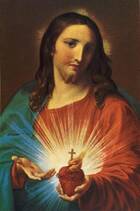
30th Sunday of the Year
with Father Andrew Pinsent, in Year A ![]()
LOVE
"Against this background, what is so unique about Christianity, also prefigured in Judaism, can perhaps be seen more clearly. St John proclaims that God so loved the world that He gave His only Son, that whoever believes in Him should not perish but have eternal life. God, in other words, loved us first while we were yet sinners. Notice also the characteristics of the love God has for us. In today's first reading, God does not think of the evil done to strangers, to widows and orphans merely as contravening some rational system of justice. God's justice is personal, arising from God's love, so that harm done to other persons is like harm done to the sons and daughters of God Himself. 'If ever you wrong them and they cry out to me, I will surely hear their cry.' God is not therefore cold, distant and uninvolved. God is like a consuming fire. Indeed the great Christian symbol of the love of God is that of the Sacred Heart: the heart of Jesus Christ exposed encircled with thorns and aflame with divine love."
Readings: Gospel - Matthew 22: 34-40 - "You shall love the Lord, your God, with all your heart, with all your soul, and with all your mind. This is the greatest and the first commandment."
31st Sunday of the Year
with Father Marcus Holden, in Year A ![]()
The Chair of St Peter & the teaching authority of the Church
"One of the great minds of the 19th century, Blessed John Henry Newman, converted to Catholicism precisely because of its teaching authority. For Newman it became a straight choice between Catholicism or no revelation from God at all; there was no middle ground for him. Christianity would not be credible if God had not given clarity and direction, a living voice of teaching authority, a guaranteed and reliable continuation of Jesus's teaching on earth. If this faith, this Christianity, is so vital for all human beings, as Jesus and his followers claimed, then it must have an infallible and consistent expositor, an expounder for all times and all places. Only the Pope and the bishops around the world claimed and exercised the authority throughout history. Only they, concluded Newman, are worthy of belief because only they fit the job description and have the qualifications. And this is the Church - a moral miracle, an ever present phenomena. As the historian traverses the anals of history, he sees the world and society change and yet, in each and every age, and in every place, he finds the Church, he finds her teaching with the same clear living voice."
Readings: Gospel - Matthew 23: 1-12 - "Jesus spoke to the crowds and to his disciples, saying, "The scribes and the Pharisees have taken their seat on the chair of Moses. Therefore, do and observe all things whatsoever they tell you, but do not follow their example. For they preach but they do not practice."
32nd Sunday of the Year
with Father Marcus Holden, in Year A ![]()
Death and Judgement
"Death, while remaining momentous and awefilled, is also a grand entrance into the great eternal wedding feast to the nuptials with God, for whom we're made. We're not here to live with a depressive knowledge and acceptance of impending doom. No, 'for me to live is Christ and death is gain'. If only we had the faith to see this and to hold it as a reality, then everything would change for us. Wisdom in this area is like walking a tightrope, between that paralysing fear and glib optimism, presumption. Our Lord in his preaching constantly holds these two messages together. He always warns and speaks of urgency but so many, many times he also says 'Do not be afraid.'"
with Father Andrew Pinsent, in Year A ![]()
The Parable of the Wise and Foolish Bridesmaids
"The Parable of the Wise and Foolish Bridesmaids .. St Augustine says that this is a difficult parable to understand but he offers an interpretation in his 43rd sermon on the New Testament Readings; it is essentially his interpretation that I offer you today.... in In summary, this parable is a warning that is directed particularly to Christians about some of the more subtle temptations of the Christian life. It is not enough to abstain from evil, to follow Christ and have good works, unless it is genuine charity or divine love that forms our actions. This love is not something we can buy or borrow from others but arises uniquely from a communion with God through prayer and the sacraments, in which we come to know God, not just know about God, and to love with God the things that God loves. So let us ask the Lord to strengthen the virtue of charity in us so that we may be among the wise who are ready to meet Him when He comes in glory."
Readings: Gospel - St Matthew (25:1-13): Then the kingdom of heaven will be like ten virgins who took their lamps and went out to meet the bridegroom. Five of them were foolish and five were wise. The foolish ones, when taking their lamps, brought no oil with them, but the wise brought flasks of oil with their lamps. ..
with Father Marcus Holden, in Year C ![]()
The Holy Souls & Purgatory
"The Lord in His mercy has given us, those who die in friendship with him, the possibility of purification, of perfecting, after death. And this is good news. It is God's gift to save His imperfect friends… The souls of purgatory are aided by us as instruments, they are held by us in the providence of God. And it is comforting that we are not completely separated from our loved ones once they pass through the vale of death; we can still relate to them, we can still have a hand in their journey. God, in His providence, wants us to look after one another, not just in this world but forever. So the saints pray for us and help us, and we can help the holy souls. The Church extends of course from earth to heaven and includes purgatory. The most powerful thing we can do for the holy souls is to offer Mass for them. In the Mass, heaven and earth are united and the sacrifice which saves us is made really present."
33rd Sunday of the Year
with Father Marcus Holden, in Year A ![]()
Hell and Heaven
"In the end, it is a matter of free will. If free will did not exist, hell would not exist. If free will did not exist, there would not be a heaven of those who choose to love God and serve Him and follow Him. Hell is the flip side of that coin of right choice. Love demands that we are free, but it also demands that we can choose the opposite. I remember the story of Padre Pio, one of the great saints of the 20th century, when a man came to him for confession and said 'I don't believe in hell', Padre Pio said 'You will believe it when you get there.' And also the fact that, when the Blessed Virgin Mary appeared to the children at Fatima, she showed them a vision of hell, nothing like we would do in talking about God; but she did. That's because she cares, because this is a reality, and God wishes, desires no-one to be lost but all to be saved and to come to the knowledge of the truth because He loves us, but He allows us the freedom to choose to be separated from Him."
with Father Andrew Pinsent, in Year A ![]()
The Parable of the Talents
"What does it mean to be productive with the Lord's wealth? How do we avoid the fate of the wicked and lazy servant and indeed how do we store up spiritual treasure in heaven? All saints are saved and perfectly happy but some have been made capable of even greater happiness than others. In a society accustomed to high levels of material production, it might appear that we have to have productive spiritual lives as well, perhaps generating a certain number of prayers or good deeds. But such an interpretation cannot be correct. There are many saints who seem to accomplish very little during their life times. The thief on the cross beside Jesus did nothing except beg for mercy, "Jesus, remember me when you come into your kingdom", for which action Jesus promised him paradise that very day. St Aloysius Gonzage died as a Jesuit novice at the age 23 without even reaching ordination; St Thérèse of Lisieux died at age of 24 and only wrote 1 short book. Many other saints die in infancy, having received baptism but apparently producing nothing in this world. What then does it mean to be productive with the Lord's wealth? A clue to an answer can be seen in the way that the other servants double their master's wealth in this parable... The true work of the Christian is to be conformed to Christ, to become like Christ.'
with Father Marcus Holden, in Year C ![]()
Remembrance Sunday & the Gift of Life
"Pope Benedict surprised people on his recent visit to Britain by mentioning the war! The beatification of Cardinal Newman coincided with the 70th anniversary of the battle of Britain. He singled out our national contribution to defeating that evil ideology of Nazism. He gave great praise to our war dead - he honoured them. He reminded us that he lived through those dark days when many did not recognise the evil that had come. From his great wisdom and experience and inspiration he reminded us of new threats, new persecutions and distortions of truth we in our time have to be aware of.
He warned several times against aggressive secularism - a kind of dictatorship he called it - a dictatorship of relativism where definite beliefs about what is true, right and good are put aside. He said this at Glasgow, "There are some who now seek to exclude religious belief from public discourse, to privatise it or even to paint it as a threat to equality and liberty." He exhorted us to be ready "to put the case for the promotion of faith's wisdom and vision in the public forum. Society needs clear voices which propose our right to live, not in a jungle of self-destructive and arbitrary freedoms, but in a society which works for the true welfare of its citizens and offers them guidance and protection in the face of their weakness and fragility .. Do no be afraid to take up this service."
There is still such a thing as valour, as honour, as sacrifice - things which we learn from our beloved war dead - these noble virtues are still possible because truth remains, because hope is still with us, but above all because there is still love in our hearts."
